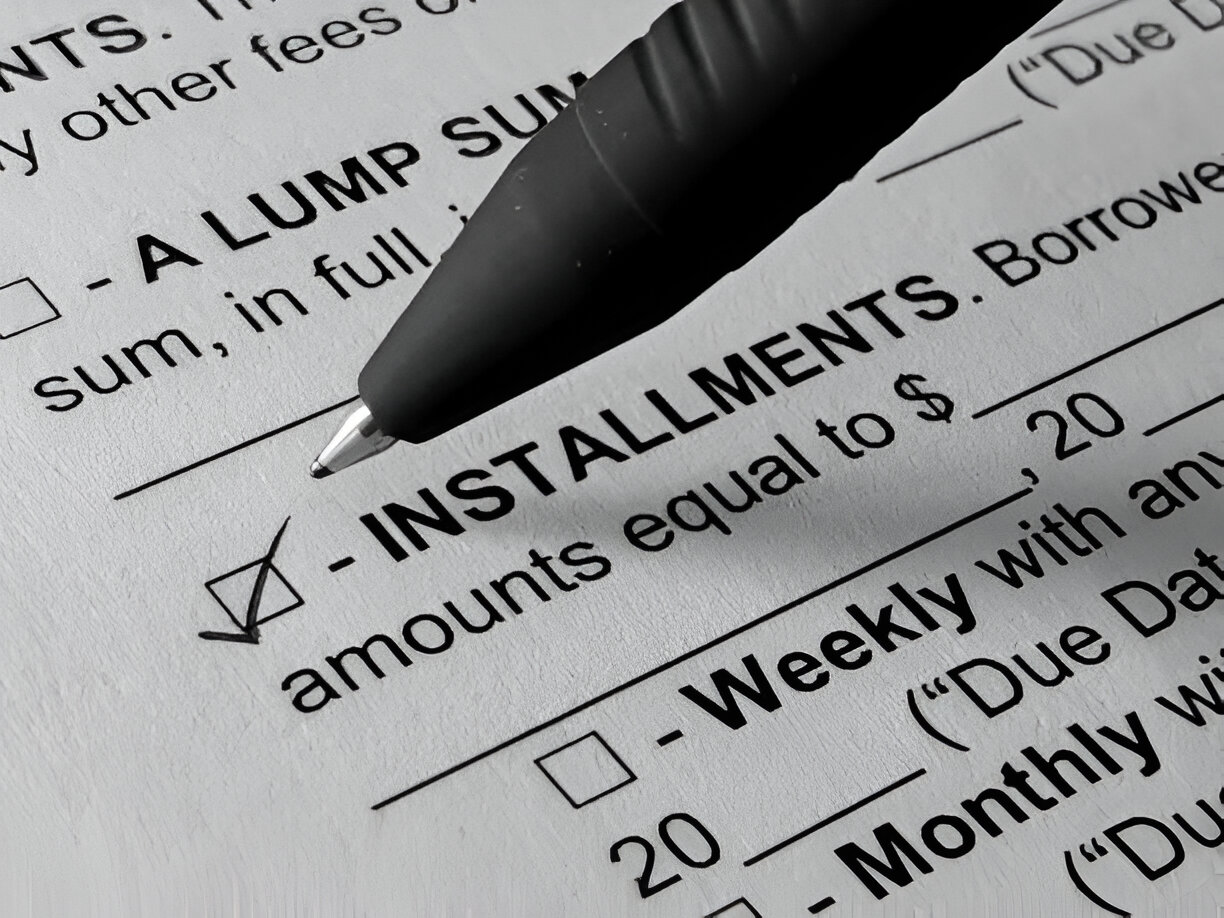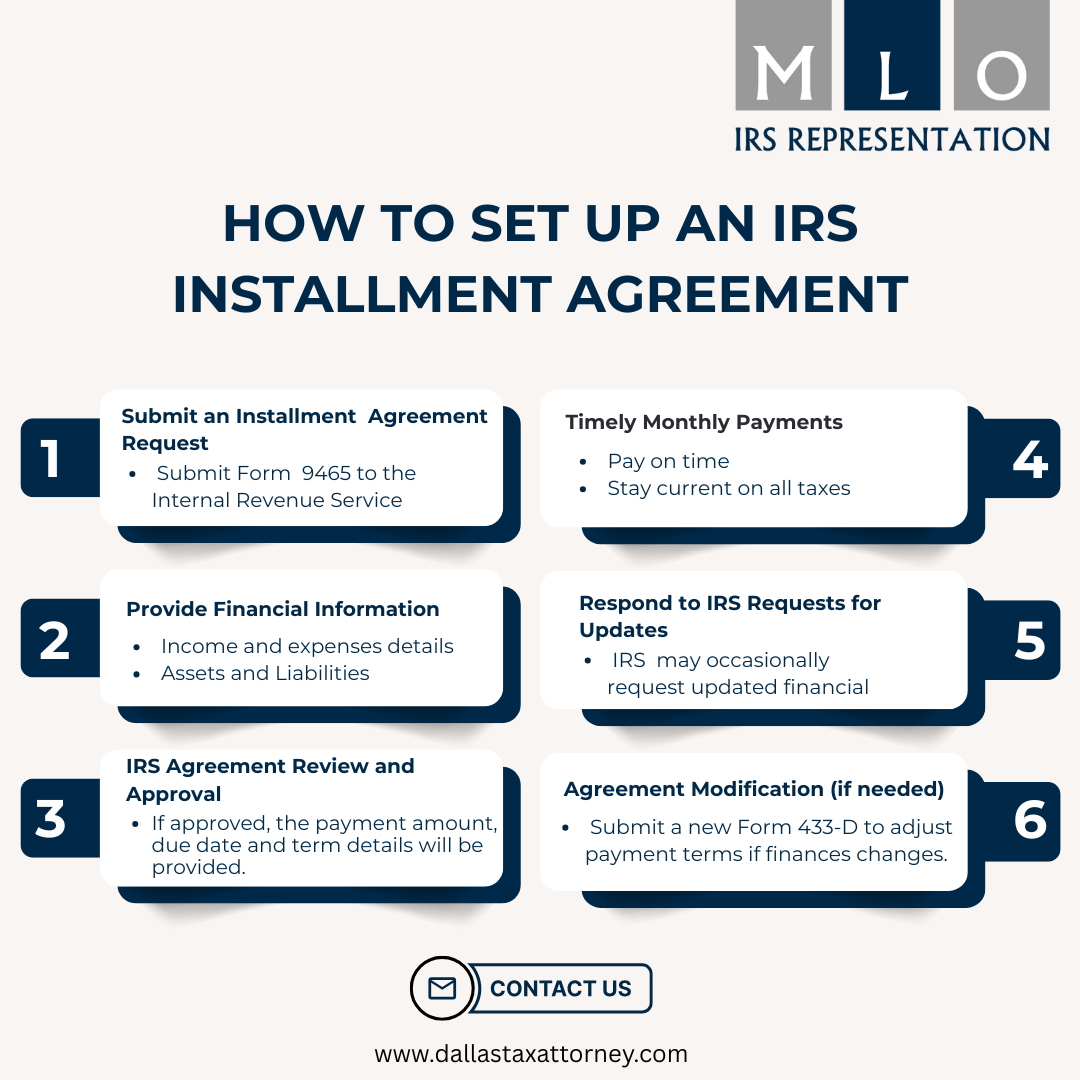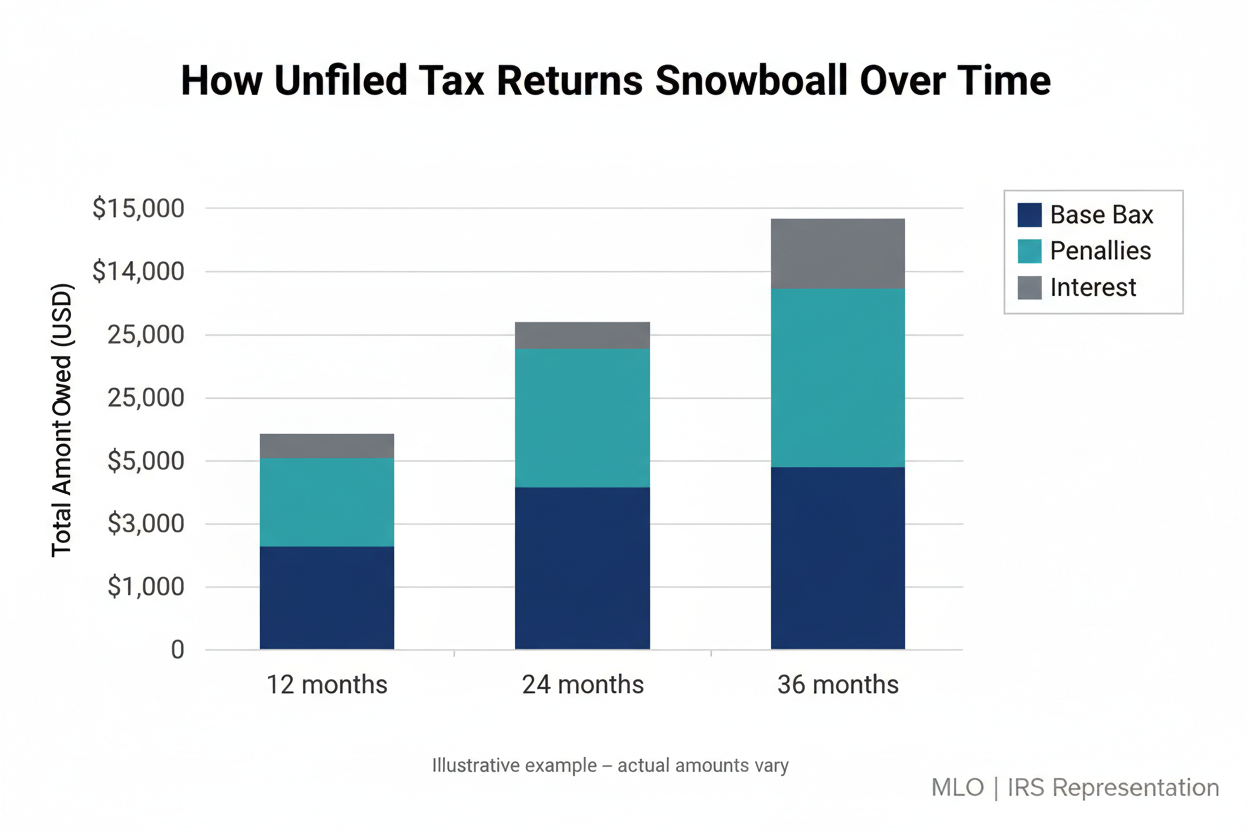IRS Installment Agreement: The Consequences and How to Settle

Defaulting on an IRS installment agreement can lead to immediate collection actions such as federal tax liens and wage garnishments, escalating your tax liability.
- To avoid default, ensure timely payments and stay current on new tax obligations, as the IRS defines default as any violation of the agreement terms.
- If you default, promptly contact the IRS to reinstate your agreement by paying missed amounts or making a modified payment, and be prepared to provide updated financial information.
- If the IRS rejects your reinstatement request, you can appeal through the Collection Appeals Program, providing a chance to contest terminated agreements or collection actions.
Defaulting on an IRS installment agreement can result in severe consequences, such as immediate collection actions like federal tax liens and wage garnishments. Common causes for default include missed payments, new tax liabilities, and failure to file tax returns or provide updated financial statements. To reinstate a defaulted agreement, contact the IRS in Dallas, TX promptly, pay missed amounts, and possibly provide updated financial information.
What Is an IRS Installment Agreement?
An installment agreement (also called an IRS payment plan) is an agreement with the IRS allowing a taxpayer in Dallas, TX to pay their tax liability over time. The IRS offers several types of installment plans, including:
- Guaranteed and streamlined agreements
- Partial-pay installment agreements
- Payroll deduction agreements
- Direct debit payments

If the IRS accepts the terms of your installment agreement, it prevents the IRS from levying your assets, ensuring compliance and efficiency for both parties.
The IRS defines default as any violation of the terms of the agreement, including missed payments or failure to stay current on new tax obligations.
IRS Installment Agreement Process

The IRS Installment Agreement Request Form 9465
If your financial situation does change, you may be able to modify your installment agreement by submitting a new Form 433-D, Installment Agreement. This flexibility allows you to adjust your payments based on your current financial condition, helping you stay on track and avoid default.
Pro Tip: Not sure what to do? It’s always best to seek advice from a tax professional. Contact Andrew Margolies for help with your tax inquiries!
IRS Installment Payment Options
The IRS provides various installment payment options to suit different taxpayer needs, such as direct debit payments, payroll deduction agreements, and manual payments via check or money order. Direct debit payments automatically deduct the monthly amount from your bank account, ensuring timely payments and reducing the risk of default. Payroll deduction agreements allow employers to send monthly payments directly to the IRS from your wages, simplifying the process. If you prefer manual payments, you can mail a check or money order each month.
Additionally, online payment systems like the Electronic Federal Tax Payment System (EFTPS) offer secure and convenient payment options. It's crucial to choose the method that best fits your situation and ensure timely payments to avoid default or termination of your installment agreement. Be aware that certain payment options, such as payroll deduction agreements, may incur fees.
What Causes a Default on an IRS Installment Agreement?
There are several ways a taxpayer in Dallas, TX fails to meet their installment plan terms. Common reasons for defaulted installment agreements include:
1. Missed or Late Payments
A single missed payment can trigger default. If a taxpayer misses their scheduled monthly payment, it places their agreement in jeopardy. Even if you’ve paid consistently before, failing to make your scheduled monthly payment places your agreement in jeopardy.
2. New Tax Liability
If you pay another tax liability late or incur a new tax liability (such liability as unpaid estimated tax payments) while under an existing installment agreement, the IRS may propose termination.
3. Failure to File Tax Returns
Not filing a tax return on time—even if you don’t owe additional taxes—can terminate your installment agreement.
4. Incomplete Financial Disclosures
When the IRS requests updated financial statements, failure to provide them may lead to default, as it is crucial to assess the taxpayer's financial condition.
5. Bounced or Rejected Payments
Changes to your bank accounts or insufficient funds can lead to rejected direct debit payments—a technical default under the IRS rules.
What Happens If You Default?
So, what exactly happens if you default on your IRS installment?
1. Termination of Agreement
The IRS will send a notice of federal intent to terminate, also known as a proposed termination. Once the termination date arrives, the agreement is canceled, and the remaining balance becomes immediately due.
2. Immediate Collection Actions
If the IRS determines that you’re in default, the agency can take immediate collection actions. Revenue officers are responsible for managing these actions and ensuring compliance with IRS policies. The agency can:
- File a federal tax lien
- Issue levies on bank accounts
- Begin wage garnishments
- Accelerate collection before the collection statute's expiration date
3. Loss of Protections
You lose the protection from collection efforts previously offered under such an agreement.
4. Added Penalties
Defaulted installment agreements often result in additional penalties and interest, further increasing your tax liability.
IRS Form 433-D
IRS Form 433-D, Installment Agreement, is a critical document used to establish the terms of an installment agreement between the taxpayer in Dallas, TX and the IRS. This form outlines the payment terms, including the monthly payment amount, due date, and length of the agreement.
Get here the IRS Form 433-D from Internal Revenue Service.
To complete Form 433-D, you must provide detailed financial information, including your income, expenses, assets, and liabilities. This information helps the IRS determine your ability to pay and set a reasonable monthly payment amount.
By signing Form 433-D, you indicate your agreement to the terms and conditions outlined by the IRS. It is essential to provide accurate financial information, as the IRS may request additional documentation to support your financial condition.
Form 433-D is typically used for individual taxpayers, while businesses may use Form 433-B, Collection Information Statement. Accurate and complete financial disclosures are crucial to ensure that the IRS can fairly assess your ability to pay and establish a manageable installment agreement.
By understanding and properly completing Form 433-D, you can set up a structured payment plan that helps you manage your tax liability and avoid default.
How to Reinstate Your Installment Agreement in Dallas, TX
Fortunately, it is often possible to reinstate your installment agreement—but it takes prompt action.
1. Contact the IRS Immediately
Reach out using the number listed in your IRS notice. Ask to request reinstatement of your plan.
2. Pay Missed Amounts or Make a Modified Payment
You may be required to pay a modified payment or even pay a modified payment amount that reflects your taxpayer’s financial condition. In some cases, the IRS may consider additional monthly payments if the new liability results in no more than two additional monthly payments and does not extend beyond the Collection Statute Expiration Date.
3. Provide Updated Financial Information
The IRS may ask for an updated financial statement to reassess the taxpayer's ability to pay. This will be reviewed through the integrated data retrieval system or a revenue officer.
4. Be Prepared to Pay a Reinstatement Fee
In many cases, a reinstatement fee applies, unless waived due to low income or hardship.
5. Get Managerial Approval
In complex cases or for higher liabilities, a managerial approval may be required to proceed.
Options if the IRS Rejects Reinstatement
If your request is denied, you can appeal the decision:
- File a collection appeal request
- Use the Collection Appeals Program (CAP) via the IRS Independent Office of Appeals
A Collection Appeals Program (CAP) hearing is an important step for taxpayers facing proposed terminations or defaults, allowing you to contest these determinations within a specified timeframe.
These channels allow you to challenge terminated agreements or collection actions that may not reflect your current financial condition.
Tips to Avoid Future Defaults
Preventing another default on an IRS installment agreement requires vigilance and discipline. Here's how:
- Set up payroll deduction agreements or direct debit payments to ensure timely payments.
- Stay current with estimated tax payments and new tax return filings.
- Inform the IRS immediately if your taxpayer’s ability to pay changes due to hardship or job loss.
- Avoid taking on additional liability during the term of your agreement.
Final Thoughts
A default on an IRS installment agreement can feel like a major setback—but it’s not the end. Whether you’ve missed a monthly payment, failed to file a return, or encountered new tax issues, you still have options. Take action quickly, provide the required financial information, and explore ways to reinstate your installment agreement or negotiate a modified payment amount.
If you’re unsure where to begin or overwhelmed by IRS notices and penalties, professional support can make all the difference.
Need Help With a Defaulted IRS Installment Agreement?
At Margolies Law Office, we specialize in assisting taxpayers in resolving defaulted installment agreements and effectively communicating with the Internal Revenue Service. Our experienced team is dedicated to finding long-term solutions tailored to your unique financial situation.
Reach out to Margolies Law Office today to regain control of your tax debt and ensure compliance with IRS installment terms. Let us guide you through the complexities of the IRS process and help you achieve peace of mind.
Frequently Asked Questions
1. Will the IRS file a lien if I have an installment agreement?
Generally, if you have an active installment agreement and are making timely payments, the IRS will not file a federal tax lien. However, if you default on your agreement, a lien determination may be necessary to secure the government’s interest in your assets. If you default on your agreement by missing payments or incurring new tax liabilities, the IRS may proceed with filing a lien to secure the government’s interest in your assets.
2. How many years can be on an IRS installment agreement?
The length of an IRS installment agreement can vary. Typically, the IRS allows taxpayers to extend payments over a period of up to 72 months, or six years. However, the exact duration can depend on your specific tax liability and financial situation, and in some cases, longer terms may be negotiated.
3. Can I reinstate my installment agreement after defaulting?
Yes, it is often possible to reinstate a defaulted installment agreement. You should contact the IRS immediately, pay any missed amounts or make a modified payment, and provide updated financial information if requested. Be prepared to pay a reinstatement fee unless it's waived due to low income or hardship.
4. What should I do if the IRS rejects my reinstatement request?
If the IRS rejects your reinstatement request, you can file a collection appeal request or use the Collection Appeals Program (CAP) via the IRS Independent Office of Appeals. These channels allow you to challenge terminated agreements or collection actions that may not reflect your current financial condition.

.webp)

%20-%20Copy.jpg)
